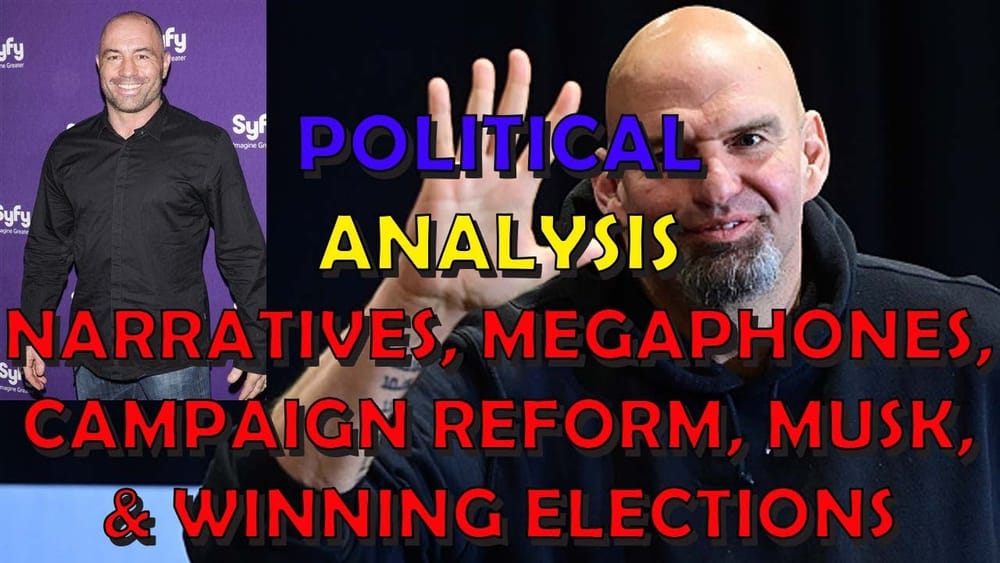Politics Extra: Narratives, Megaphones, Campaign Reform, Musk and Winning Elections
Table of Contents 📖
Hello Team
🎦 00:00-00:11⏩
Jonathan welcomes the viewers to the video and explains he will be discussing political communication.
Return to top⤴️
UK and US Political Campaign Finance Regulation
🎦 00:11-00:46⏩
Jonathan highlights the differences in political campaign finance regulations between the UK and the US, noting that:
- The UK has stricter regulations and elections are relatively inexpensive, costing around £10 million.
- US elections, on the other hand, involve raising billions of dollars.
Elon Musk's £100 Million Donation to Reform Party
🎦 00:46-01:14⏩
Jonathan discusses Elon Musk's intention to donate £100 million to the Reform Party in the UK and notes that:
- The Reform Party is not a political party but a private, for-profit corporation.
- Current UK laws do not prevent such donations outside of election periods.
Elon Musk's Influence on Political Outcomes and Narratives
🎦 01:14-01:44⏩
Jonathan expresses concern that Elon Musk's donation could allow him to dictate political outcomes in the UK.
Return to top⤴️
Elon Musk's Use of Twitter to Control Narratives
🎦 01:44-02:01⏩
Jonathan states that Musk, through platforms like Twitter (X), can spread misinformation and control narratives, referencing his attempts to do so in Germany.
Return to top⤴️
Elon Musk's Right-Wing Populist Alignment
🎦 02:01-02:38⏩
Jonathan notes that Elon Musk has become a right-wing populist and is concerned that he promotes extremist ideologies packaged as beneficial for the nation, while his actual aim is to deregulate economies for personal gain.
Return to top⤴️
Elon Musk's Intervention in UK Politics
🎦 02:38-03:01⏩
Jonathan highlights Musk's increased involvement in UK politics, including the claim that "only Reform can save Britain".
Return to top⤴️
Elon Musk's Call For a New UK Election
🎦 03:01-03:15⏩
Jonathan reports that Elon Musk, influenced by a Twitter user, is calling for a new UK election.
Return to top⤴️
UK Political Polls and Public Opinion
🎦 03:15-03:48⏩
Jonathan discusses recent polls showing a decline in support for the Labour government, noting that both major UK parties are currently unpopular, and warns that surveys can be manipulated, referring to one poll where half the respondents were in Belize.
Return to top⤴️
The UK Population and Narrative Manipulation
🎦 03:48-04:20⏩
Jonathan asks whether the UK population can be manipulated by narratives and how political parties can control or influence these narratives.
Return to top⤴️
Twitter as a News Aggregator
🎦 04:20-04:39⏩
Jonathan states that Twitter is not a news source, but an aggregator of news, and that mainstream media outlets use Twitter to deliver their news. He also believes that Musk should be careful about his claims for what Twitter is.
Return to top⤴️
Political Parties and Social Media
🎦 04:39-04:54⏩
Jonathan notes that some political parties, like the Democrats in the US and Labour in the UK, are focusing too much on mainstream media and not enough on campaigning through social media.
Return to top⤴️
Tommy Robinson's Imprisonment
🎦 04:54-05:29⏩
Jonathan discusses Tommy Robinson's imprisonment for contempt of court, clarifying that he was guilty of illegal actions and therefore his imprisonment was justified.
Return to top⤴️
Elon Musk's Support for Tommy Robinson
🎦 05:29-06:28⏩
Jonathan states that Elon Musk is playing into far-right narratives, and that he has gone "full on populist far right" by claiming Tommy Robinson is a political prisoner who should be freed. He expresses concern that Musk is getting involved in divisive politics he knows nothing about.
Return to top⤴️
The Truth Behind Tommy Robinson's Imprisonment
🎦 06:28-07:44⏩
Jonathan provides context for Tommy Robinson's imprisonment, explaining that he spread misinformation about a Syrian refugee child attacked at school, and that he violated court orders which led to his imprisonment for contempt of court. He also states that he was not sentenced to solitary confinement and requested to be kept separate for his own safety.
Return to top⤴️
The Danger of Elon Musk's Actions
🎦 07:44-08:27⏩
Jonathan explains that Elon Musk is dangerously promoting misinformation and is calling for new elections in Britain due to Tommy Robinson's imprisonment and is offering £100 million to Reform to campaign on these issues.
Return to top⤴️
Campaign Finance Reform
🎦 08:27-08:51⏩
Jonathan begins to discuss campaign finance reform, noting that the US has better campaign regulation in some areas than the UK, despite the UK being generally more regulated.
Return to top⤴️
Alastair Campbell and Rory Stewart's Podcast
🎦 08:51-09:27⏩
Jonathan introduces Alastair Campbell (a left-winger) and Rory Stewart (a former Conservative MP) who host "The Rest Is Politics" podcast, which Jonathan enjoys for its range of views and common ground.
Return to top⤴️
Preventing Large Political Donations
🎦 09:27-10:01⏩
Jonathan highlights the need to prevent large donations to political parties, arguing that it should be stopped at any amount from foreign citizens and that UK elections are cheap.
Return to top⤴️
The Worry of Money Dictating Elections
🎦 10:01-10:29⏩
Jonathan expresses concern that money will start to dictate elections in the UK, similar to "Citizens United" in the US, and that despite the perception of Democrats outspending Republicans in the US, this may not be the case.
Return to top⤴️
Republicans Spending on New Media
🎦 10:29-10:37⏩
Jonathan suggests that Republicans have spent money more effectively, investing in new media and social media platforms.
Return to top⤴️
Campaign Finance Regulations Needed
🎦 10:37-10:57⏩
Jonathan states that allowing large donations into political campaigns is like playing poker when one player can put down £10,000 when others are betting small amounts, and that rules need to change to prevent this from happening.
Return to top⤴️
Musk is a Greater Threat Than Trump
🎦 10:57-11:17⏩
Jonathan states that Musk is a greater threat than Trump, describing him as a "genuine fascist" who loves being part of a political movement.
Return to top⤴️
Musk's Endorsement of Far-Right Groups
🎦 11:17-11:45⏩
Jonathan highlights Musk's endorsements of far-right groups including AFD in Germany, Reform UK in the UK and a Belgian neo-Nazi activist.
Return to top⤴️
Musk's Alignment with Fascism
🎦 11:45-11:52⏩
Jonathan believes that Musk's actions indicate he is aligned with fascism.
Return to top⤴️
Musk's Use of Social Media Propaganda
🎦 11:52-12:05⏩
Jonathan highlights that Musk loves using propaganda, demonstrating the power of social media, and that he is doing something with the X (Twitter) platform that no one has tried to do before.
Return to top⤴️
Social Media as a Weapon
🎦 12:05-12:27⏩
Jonathan compares the use of social media to a weapon, stating that whilst during the Arab Spring social media platforms were pretending to play by the rules, with Musk, the weapon is in the hands of somebody who wants to promote far-right groups and ideologies.
Return to top⤴️
Elon Musk's Ruthless Nature
🎦 12:27-12:48⏩
Jonathan thinks that Musk should not be underestimated, and that he is incredibly clever and ruthless, referencing his actions in backing policies in California to benefit his business in Texas.
Return to top⤴️
Musk's Pragmatic Business Approach
🎦 12:48-13:09⏩
Jonathan believes that Musk will stick with Trump because he's a pragmatic and ruthless businessman, thinking that being close to Trump will allow him to get away with his crazy fantasy.
Return to top⤴️
Musk as President and Trump as Vice President
🎦 13:09-13:29⏩
Jonathan references Adam Kinzinger, a former Republican, who refers to Musk as "President Musk" and Trump as "Vice President Trump".
Return to top⤴️
Undermining Trump and Musk
🎦 13:29-13:47⏩
Jonathan agrees that referring to Musk as "President Musk" and Trump as "Vice President Trump" is a clever way of undermining both of them and that the more the idea that Musk is the "first husband", the more you can irritate both of them.
Return to top⤴️
Restrictions on Donating to US Political Campaigns
🎦 13:47-14:03⏩
Jonathan references people wanting to donate to Kamala Harris' campaign and explains that British citizens are not permitted to donate to American political campaigns.
Return to top⤴️
Principles for Campaign Donations
🎦 14:03-14:17⏩
Jonathan says there are 2 principles for campaign donations, firstly they should be from a British citizen and secondly no individual should be able to donate £100 million, it's "completely grotesque".
Return to top⤴️
The Need for State Funding of Political Parties
🎦 14:17-14:38⏩
Jonathan suggests that political parties need to move towards state funding or very strict limitations on donations, to prevent the Conservative party being funded by hedge funds/oligarchs and the Labour party being funded by trade unions.
Return to top⤴️
Restrictions on Political Campaign Spending
🎦 14:38-14:59⏩
Jonathan and Rory Stewart briefly discuss Europe, before moving on to the need to restrict campaign spending, though acknowledging people will argue about "freedom of speech".
Return to top⤴️
Money Dictating Politics
🎦 14:59-15:23⏩
Jonathan explains that when money dictates political outcomes, you effectively have bribery, and that people bribe politicians to make rules on their behalf.
Return to top⤴️
The Rich and Elitist Politics
🎦 15:23-15:41⏩
Jonathan states that the richest people ultimately get what they want in this system, and that people are constrained by the politics of the wealthy. He believes this is not freedom.
Return to top⤴️
True Freedom
🎦 15:41-15:57⏩
Jonathan argues that true freedom would be restricting people's ability to use money in this way, stating that people are becoming prisoners to the financially well-off.
Return to top⤴️
Podcast discussing Farage's Dodgy Practices
🎦 15:57-16:30⏩
Jonathan references a podcast from Politics Joe, discussing Nigel Farage and his dodgy practices, and how he skirts around the rules of political campaigning.
Return to top⤴️
Nigel Farage's Direct Communication With The Electorate
🎦 16:30-16:56⏩
Jonathan explains that Farage uses social media to directly reach voters, bypassing traditional media which is subject to regulation requiring equal representation from all parties.
Return to top⤴️
Social Media Regulation
🎦 16:56-17:41⏩
Jonathan highlights the differences between regulated mainstream media and unregulated social media, noting that whether people are watching a TV or a screen, there is a double standard in terms of regulation.
Return to top⤴️
Nigel Farage's Use of Misinformation
🎦 17:41-18:17⏩
Jonathan references Nigel Farage using misinformation to stoke up issues concerning the Stockport stabbings and that he was able to get away with this because it was on social media and not mainstream media.
Return to top⤴️
Politicians Communicating Directly With Voters
🎦 18:17-18:48⏩
Jonathan states that politicians taking their message directly to voters is fine, and that journalists can get "pearl clutchy" about this, stating "no one owes us a living" or interviews.
Return to top⤴️
Politicians Grasping Media Reality
🎦 18:48-19:14⏩
Jonathan thinks that politicians need to grasp the reality of the current media environment and references how successful he and Rory Stewart are with their podcasts.
Return to top⤴️
The Need for Media Regulation
🎦 19:14-20:28⏩
Jonathan states that if politicians think it is important that mainstream media is regulated and that big media providers should have a sense of impartiality, then it shouldn't matter how the media is delivered, be that on a TV or a phone, and that there is a "massive double standard".
Return to top⤴️
Lack of Political Will to Grapple with Social Media Regulation
🎦 20:28-20:46⏩
Jonathan believes that no politician is willing to deal with social media regulation and that this discrepancy between traditional media and social media is going to become more "gaping" as the latter gets bigger.
Return to top⤴️
A Generational Divide
🎦 20:46-21:30⏩
Jonathan suggests that the reluctance to regulate social media is a generational thing, noting that people in charge may not understand the internet as they didn't grow up with it.
Return to top⤴️
The Internet and Speed of Change
🎦 21:30-21:41⏩
Jonathan thinks that the internet is accelerating at such a pace it's like "genies out of the bottle" and that the people in charge are still trying to catch the genie.
Return to top⤴️
Broadcast Media as a Stolid Industry
🎦 21:41-22:11⏩
Jonathan states that broadcast media is a stolid industry dominated by the same people for long periods of time.
Return to top⤴️
The Slow Turnover of Journalists
🎦 22:11-22:40⏩
Jonathan discusses his hobby of watching election nights repeatedly, and notes the slow rate of turnover in journalism, contrasting this with the rapid changes in politics.
Return to top⤴️
Traditional Media's Loss of Market Share
🎦 22:40-23:07⏩
Jonathan suggests that traditional media have been slow to innovate and have lost market share to those in the digital space, due to being dominated by the same people.
Return to top⤴️
Lobby Journalists and Downing Street
🎦 23:07-23:42⏩
Jonathan notes that lobby journalists are often in constant contact with Downing Street, and wonders why he isn't contacted in the same way.
Return to top⤴️
New Media and Politicians
🎦 23:42-24:33⏩
Jonathan states that the Democrats in the US failed to embrace new media in recent elections. He also notes that in America, the right celebrate online movements, and politicians clamour to get on their shows, whereas the Democrats haven't caught up.
Return to top⤴️
Downing Street's Focus on Traditional Media
🎦 24:33-25:54⏩
Jonathan says that Downing Street are more focused on traditional media, rather than new media, and notes the asymmetry of importance that the government places on traditional media, referencing the frequency that journalists are contacted, as opposed to shows like his.
Return to top⤴️
Downing Street and New Media
🎦 25:54-26:27⏩
Jonathan does not think Downing Street understands the importance of new media, and that they should learn from the mistakes that the Democrats made in the election.
Return to top⤴️
Harnessing the Media and Democrat Failures
🎦 26:27-26:44⏩
Jonathan notes that Farage and the Republicans get how to use new media and that Brian Tyler Cohen (an American commentator) speaks about the Democrats' failures to use media effectively in recent elections.
Return to top⤴️
Brian Tyler Cohen on Democrats Strategy
🎦 26:44-27:22⏩
Jonathan introduces a clip of Brian Tyler Cohen, speaking about how the Democrats have failed in the US elections and that the analysis can be used as a generic question.
Return to top⤴️
Democrats Should Focus on Listening
🎦 27:22-28:02⏩
Brian Tyler Cohen's guest states that the Democrats should focus on "democracy" which he clarifies as "listening to people", and talking to them about their values, rather than telling them about their own.
Return to top⤴️
Democrats Out of Touch
🎦 28:02-28:55⏩
Brian Tyler Cohen's guest explains how the Democrats were out of touch with the electorate, focusing on the fact that 86% of the country didn't think Joe Biden should be the president, and that there were issues with inflation and the border. He believes they were not trusting people and talking straight to them.
Return to top⤴️
John Fetterman as a Communicator
🎦 28:55-29:18⏩
Brian Tyler Cohen's guest states that the Democratic party need more communicators like John Fetterman, as they believe what he is saying and that he's not "gaslighting" people.
Return to top⤴️
Boring and Stale Talking Points
🎦 29:18-29:40⏩
Brian Tyler Cohen's guest highlights that the "boring, stale talking points" of the Democrats is not connecting with people.
Return to top⤴️
Democrats Should Address Core Issues
🎦 29:40-30:03⏩
Brian Tyler Cohen's guest says that if the Republicans overreach (as they are likely to do), the Democrats need to address the issues that people feel in their core, and provide solutions.
Return to top⤴️
Communicating Effectively
🎦 30:03-30:44⏩
Brian Tyler Cohen's guest suggests politicians need to speak to people on a level playing field, and give the example of Pete Buttigieg, who speaks to Fox news and goes on podcasts.
Return to top⤴️
Populist Movements and Appealing to the Everyman
🎦 30:44-31:22⏩
Brian Tyler Cohen's guest notes that populists like Nigel Farage and Donald Trump are good at appealing to the "everyman" despite being part of an elite.
Return to top⤴️
Why the Working Class Support the Elite
🎦 31:22-31:45⏩
Brian Tyler Cohen's guest questions why the working class are supporting these elites, as they do not have their best interests at heart.
Return to top⤴️
Communicating With the Public
🎦 31:45-32:22⏩
Jonathan returns to talking about the UK context and how Labour should communicate with the public, noting that the government has a "weakness in comms".
Return to top⤴️
Advice on Media Management
🎦 32:22-32:47⏩
Lewis Goodall states that his advice on media management is to "talk like normal people, stop talking like robots".
Return to top⤴️
John Fetterman as an Example
🎦 32:47-33:04⏩
Jonathan references John Fetterman as a good example, due to his "hoodie wearing" style and how he comes across as a "normal guy" that has your best interests at heart.
Return to top⤴️
Politicians and Performance
🎦 33:04-33:45⏩
Jonathan finds it bewildering that politicians don't seem to understand that politics is a "performative game" and always has been.
Return to top⤴️
Politicians Who Sound Robotic
🎦 33:45-34:23⏩
Jonathan is amazed by the number of politicians that sound robotic and references politicians who say they have had "fantastic experiences with civil servants" - questioning whether that is the case.
Return to top⤴️
The Need For Politicians To Speak Normally
🎦 34:23-35:02⏩
Jonathan believes that politicians should turn to the interviewer and ask, "is everyone amazing where you work?" to highlight that it's ok not to be, and that being able to tell stories and talking normally without fear is key to communicating effectively.
Return to top⤴️
Controlled Political Communication
🎦 35:02-35:17⏩
Jonathan is amazed that there is still so much control over political communication, in an age when the most successful politicians are those who take risks and seem normal and authentic.
Return to top⤴️
Government Communication Strategies
🎦 35:17-35:41⏩
Jonathan explains that he understands why the "drone like" communication of new Labour worked previously, but that it doesn't work now and states that if he were advising the government, he would focus on selecting the best communicators and not just those who can do the job of government.
Return to top⤴️
Prioritising Communication
🎦 35:41-36:07⏩
Jonathan thinks communication should not be an afterthought and references a robotic government press release that was repetitive.
Return to top⤴️
Centre-Left and Centre-Right Messaging
🎦 36:07-36:40⏩
Jonathan states that it is no longer enough for the centre-left or centre-right to be slightly worthy and progressive, and that they need to talk about "delivery".
Return to top⤴️
The Need for a Broad Church in Politics
🎦 36:40-37:57⏩
Jonathan states that political parties should have a broad church, where lots of different people are accepted. The Democrats were criticised for passing purity tests and their responses were then used against them.
Return to top⤴️
The Need to be Savvy
🎦 37:57-38:23⏩
Jonathan thinks that political parties need to be more savvy and that the Republicans, in particular the populist right, don't care about purity tests and are going to push a narrative that focuses on immigration and inflation.
Return to top⤴️
Controlling the Media
🎦 38:23-38:38⏩
Jonathan highlights that the Republicans control the methods of communication and that they can deliver a narrative more effectively as they have control of the media landscape.
Return to top⤴️
Delivery is not Enough
🎦 38:38-39:06⏩
Jonathan suggests that the current UK government believes that if they focus on delivery, people will see the system works and will not turn to extremes, and questions whether this is the case.
Return to top⤴️
The Importance of Narrative
🎦 39:06-39:53⏩
Jonathan believes that the government can deliver all their promises well in the next 5 years, but that if Elon Musk is dominating the online space with a narrative that the government have failed, the public will believe it, and that "people can think two things at once"
Return to top⤴️
The Need for an Alternative Story and Narrative
🎦 39:53-40:42⏩




